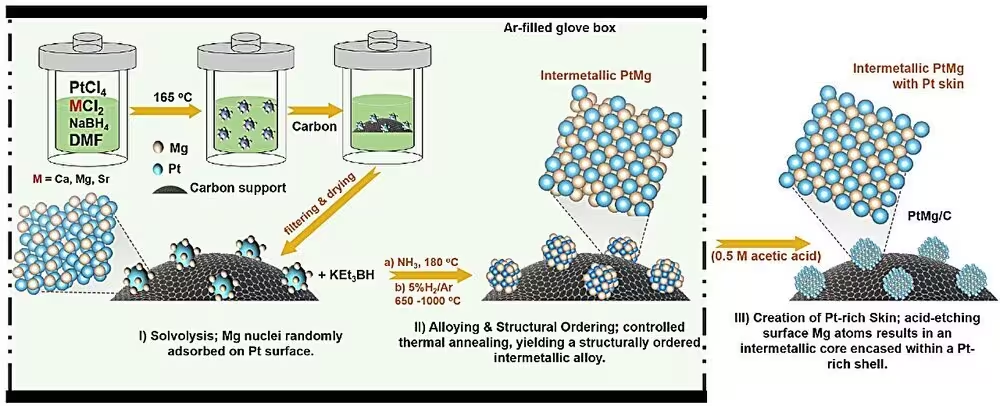Scientists from the Daegu Gyeongbuk Institute of Science and Technology (South Korea) have developed an innovative fuel cell catalyst based on platinum and magnesium. The new catalyst promises to be not only highly efficient but also durable, and has the potential to lead to significant advances in clean energy technology.
Fuel cells work by combining hydrogen and oxygen to produce electricity, and platinum is used as a catalyst to speed up these reactions. But platinum is expensive. Integrating magnesium into the alloy used in the new catalyst not only reduces costs, but also increases the fuel cell’s efficiency and durability.
This achievement is significant because researchers have long known that alloys of alkaline earth metals and platinum have great potential for fuel cells due to their high catalytic activity and stability. However, the problem of forming these alloys into nanoparticles, given the high negative reduction potential of alkaline earth metals, remained a significant hurdle.
Professor Jung-Sung Yoo and colleagues overcame this problem using a systematic solution phase approach. Theoretical studies conducted by the University of Texas at Austin have shown that the synergy between platinum and magnesium is so strong that it prevents the alloy from deteriorating over time. This keeps the catalyst effective for a long time, which is crucial for a variety of applications.
Field tests showed the new alloy exceeded the U.S. Department of Energy’s 2025 fuel cell targets, demonstrating its high efficiency and long-term stability.
“Most fuel cell catalysts balance durability and cost, but our platinum and magnesium nanoparticles overcome the difficulties of synthesis and solve these issues by combining the excellent reaction speed of platinum with the durability and usability of magnesium. This is an important step towards creating more efficient and sustainable fuel cells,” said Professor Jung-Sung Yu, who led the research.
“The new development not only improves the performance of fuel cells, but also paves the way for the use of platinum and magnesium nanoparticles in other energy technologies, such as hydrogen production and other electrochemical reactions,” added Caleb Gian-Barimah, lead author of the study.
The researchers plan to focus on improving the alloy composition and scaling up production to make these materials more affordable. Next steps include improving the alloy, researching manufacturing methods, and partnering with industry and government to bring innovations to market. The results of the research were published in the journal Nature Communications.













